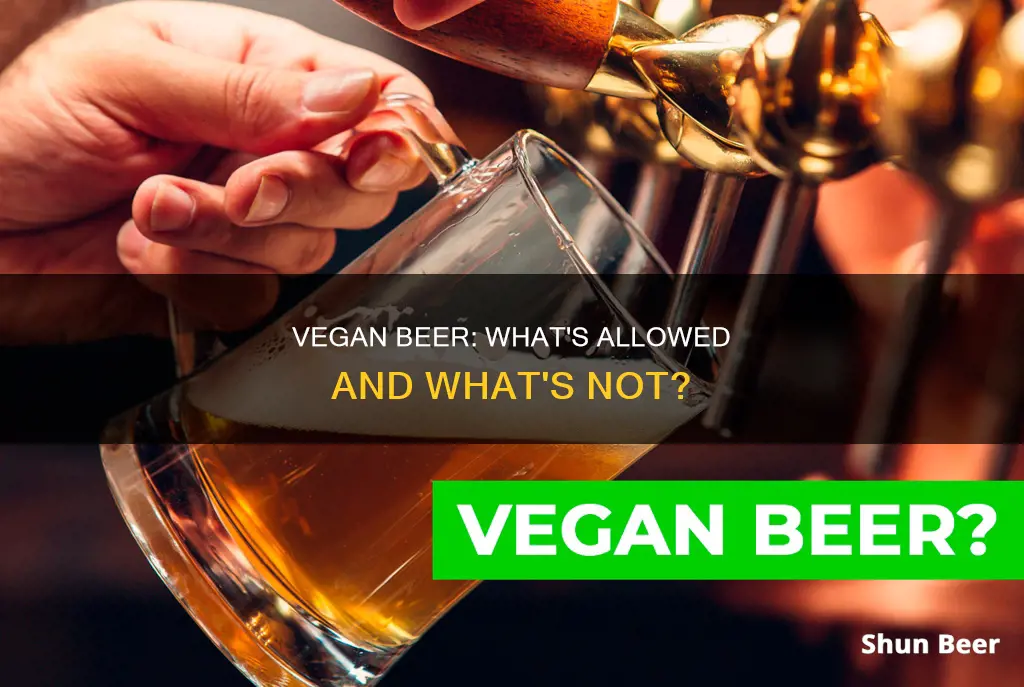
Vegans can drink beer, but not all beers are vegan-friendly. The four main ingredients in beer are water, grain, yeast, and hops, all of which are vegan. However, some breweries add non-vegan ingredients during the brewing process, such as isinglass, gelatin, whey, lactose, and honey. These additives may be used as fining agents to clarify and flavour the beer, or to enhance its colour. While it can be challenging to identify vegan beers due to the absence of ingredient lists on alcohol labels, resources like Barnivore provide comprehensive guides to help consumers make informed choices.
| Characteristics | Values |
|---|---|
| Can vegans drink beer? | Yes, but not all beers are vegan |
| Why are some beers non-vegan? | Non-vegan additives like lactose are sometimes added to beer for flavour and body. Clarifying agents that are derived from animal products can be added to the ‘fining’ process. |
| Examples of non-vegan beers | Cask ales, honey beers, meads, milk stouts |
| Examples of vegan beers | Budweiser, Bud Light, Coors, Corona Extra, Miller Genuine Draft, Guinness Draught |
| How to identify vegan beers? | Beers that are made using vegan-friendly methods will say so on the packaging. Barnivore.com is a database that tracks vegan beers across the globe. |
What You'll Learn

Common non-vegan ingredients in beer
Beer is typically made from barley malt, water, hops, and yeast, which are all vegan ingredients. However, some brewers add finings or other ingredients that are not vegan, making certain beers unsuitable for those following a vegan lifestyle.
- Isinglass is a popular fining agent derived from fish bladders. It is used to make beer clear and is often added during the fermentation process or directly into the beer keg.
- Gelatin is another fining agent used to clarify beers. It is obtained by boiling the skin, tendons, ligaments, and bones of animals.
- Glycerin is a hidden non-vegan ingredient that can be made from animal fats. It is sometimes called tallow and is derived from beef or mutton fat.
- Casein is a milk protein used in the fining process for beer and wine. It is not vegan and is a common allergen.
- Whey, lactose, and honey are sometimes added as ingredients to beer. Lactose is often found in milk stouts, sours, and chocolate stouts, while honey is added to honey beers, mead, and braggot.
- Eggs are occasionally used in beer, and egg white protein (albumin) is often used as a fining agent in wine.
- Bacon is sometimes used to add a smokey flavor to beer.
- Clams are used in Clamato beers, which are not vegan.
- Oysters are used in oyster stouts, which are not vegan.
It is important to note that not all beers contain these non-vegan ingredients, and there are many vegan-friendly options available. Some popular vegan beers include Budweiser, Coors Light, Corona Extra, and Guinness Draught.
Beer and Broken Bones: What's Safe to Drink?
You may want to see also

How to find out if a beer is vegan
It can be tricky to find out if a beer is vegan. Manufacturers are often not required to list ingredients on beer labels, and animal products may be used during processing or as ingredients in the drink itself.
- Check the label for vegan symbols or text: Some companies indicate vegan status on the product label, so look out for vegan trademarks or text that says the product is vegan.
- Look for allergen statements: Milk, eggs, fish, and shellfish are common allergens, and companies may voluntarily list them on the label.
- Check for a carmine statement: In the US, manufacturers are required to mention carmine, so look out for phrases like "contains carmine" or "contains cochineal extract" on the label.
- Use online resources: Websites like Barnivore and PETA have lists of vegan beers. Barnivore has a directory of over 44,000 vegan-friendly alcoholic drinks, while Veggiebeers is a helpful mobile phone app for vegetarians, vegans, and celiacs.
- Contact the manufacturer: If you're still unsure, the most reliable way to find out if a beer is vegan is to ask the manufacturer.
- Choose German or Belgian beers: German and Belgian beers are usually vegan because they only use traditional brewing methods.
- Avoid certain types of beer: Cask ales, honey beers, meads, and milk stouts typically aren't vegan.
Beer and Prostate Surgery: What You Can Drink Post-Op
You may want to see also

The difference between vegan and non-vegan beer production
The core ingredients of beer are vegan-friendly: water, hops, yeast, and malt. However, the addition of extra ingredients during the brewing process or the use of animal-derived fining agents can make certain beers non-vegan.
Vegan Beer Production
Vegan beers do not use any animal or insect products during brewing. Most commercial beers from established breweries are vegan, including Budweiser, Coors, Corona, Miller, and Guinness. Many craft beers are also vegan, and some microbreweries, like Alternation Brewing Company, Little Machine, and Modern Times Brewery, label their products as vegan.
Non-Vegan Beer Production
Non-vegan beers may include animal-derived ingredients such as honey, lactose, whey, or isinglass, a fining agent derived from fish bladders. Cask ales, or real ales, a traditional British brew, often use isinglass, making them non-vegan. Milk stouts typically contain whey or lactose, and meads are made by fermenting honey, so these are usually non-vegan too.
Identifying Vegan Beers
Identifying vegan beers can be challenging, as manufacturers are not required to list ingredients on beer labels. However, some beers may be labelled as vegan or display a vegan trademark. Online resources like Barnivore and the BevVeg app can also help identify vegan beers. When in doubt, contacting the manufacturer directly is the most reliable way to determine if a beer is vegan.
Drinking Beer with Flagyl: What You Need to Know
You may want to see also

The ethics of drinking alcohol as a vegan
Veganism is a way of living that seeks to exclude all forms of animal exploitation and cruelty, as far as possible and practicable. This includes the food and drinks that vegans consume.
Alcoholic drinks, such as beer, wine, and spirits, can contain animal products, which are often used during the processing or as ingredients in the drink itself. These animal products may be obvious, such as honey in honey beer or lactose in milk stouts, but many are hidden and not revealed in the name of the drink.
The most common non-vegan ingredients in alcohol are isinglass, made from the dried swim bladders of fish, gelatin, made from boiled bones, flesh, and ligaments, casein, a protein derived from cow's milk, and albumin from egg whites. These substances are used as fining agents, which help filter out impurities and improve the clarity, flavor, and aroma of alcoholic beverages. Other non-vegan ingredients include milk and cream, which are sometimes added to beer and liqueurs for a creamy, rich flavor, and honey, which is used as a sweetener in some alcoholic drinks.
Due to lax labeling requirements, manufacturers are not required to list ingredients for beer, wine, and spirits in the United States or Europe. This makes it challenging for vegans to identify whether an alcoholic drink is suitable for their diet. However, some companies voluntarily list ingredients or use vegan symbols or text to indicate the vegan status of their products.
To make an informed decision about drinking alcohol as a vegan, it is essential to consider the potential presence of animal products in the drinks. While some alcoholic drinks are naturally vegan, others may include animal-derived ingredients during processing or as flavorings. The use of these animal products may conflict with the ethical principles of veganism, which aims to exclude all forms of animal exploitation and cruelty.
Additionally, it is worth noting that alcohol consumption is associated with significant social and public health costs. Alcohol is among the most dangerous drugs when it comes to its ability to unleash widespread harm. It is linked to a high number of deaths, liver disease, drinking-related accidents, and an increased risk of certain types of cancer. Therefore, it is crucial for individuals to drink responsibly and be mindful of the potential risks associated with alcohol consumption.
In conclusion, while there are vegan alcoholic drinks available, the presence of hidden animal products in some beverages may conflict with the ethical principles of veganism. It is essential for vegans to be cautious and informed about the ingredients in their drinks. Additionally, the potential harm caused by alcohol to individuals and society should be carefully considered when making decisions about alcohol consumption.
Beer and Prozac: Safe Mix or Risky Business?
You may want to see also

The most popular vegan beers
While most beers are vegan, some include animal products as ingredients or during processing. The most common non-vegan ingredients in beer are isinglass (made from the dried swim bladders of fish), gelatin (made from boiled bones, flesh, and ligaments), casein (derived from cow's milk), and albumin (derived from egg whites). These ingredients are often used as fining agents to help filter out impurities and improve the clarity, flavour, and aroma of the beer.
- Budweiser and Bud Light
- Coors and Coors Light
- Corona Extra and Corona Light
- Miller Lite, High Life, and Genuine Draft
- Heineken
- Pabst Blue Ribbon
- Labatt Blue
- Pilsner Urquell
- Sam Adams Boston Lager
- Sierra Nevada Pale Ale and Hazy Little Thing
- Bear Republic Racer 5
- Lagunitas IPA
- Guinness Extra Stout
- Chimay
- Gulden Draak
- Purity Brewing Co. Bunny Hop Hazy Pale Ale
- Adnams Kobold English Lager
- Einstok Arctic Icelandic Pale Ale
- Duvel Belgian Strong Ale
These are just a few examples of popular vegan beers, but there are many more options available, including various craft beers and independent brewery options.
Beer and Cefdinir: Is It Safe to Mix?
You may want to see also
Frequently asked questions
Yes, you can drink beer on a vegan diet. However, not all beers are vegan-friendly. Some common non-vegan beer ingredients include lactose, isinglass, gelatin, whey, lactose, honey, eggs, and cochineal. Many popular beer brands are vegan, including Budweiser, Coors, Corona, Miller, and Guinness.
While it is not legally required to list non-vegan ingredients on beer labels, beers that are made using vegan-friendly methods will often say so on the packaging. You can also use online resources such as Barnivore, which lists the vegan status of various alcoholic beverages.
Beers can be non-vegan due to the use of animal-based products in the brewing process, such as lactose for flavour and body, or clarifying agents derived from animal products like isinglass, gelatin, or eggs.







